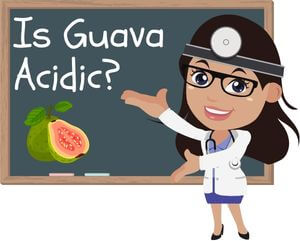Guava is a juicy, sweet, and very nutritious fruit. It is one of the most common fruits for weight loss and a favorite fruit for many people. But many people don’t know that guava has many facts attached to its refreshing and juicy taste. So what are the side effects of guava? What are the great health benefits of guava? Why must it not be consumed in excess, and Is guava acidic?. These are the most frequently asked questions on guava, and in this article, we’ve provided you with the scientific-proved answers to these questions and others.

Is Guava Acidic? Yes, it is acidic! The sourness of guava has been ascribed to its acidic nature and having a pH between 3 and 4. While the pH is the measure of alkalinity or acidity of a substance, on the pH meter, any substance having a pH between 1 and 7 is said to be acidic, while between 7 and 14 is said to be alkaline. Studies made it known that the acidity of guava is largely due to the presence of citric and malic acid.
What Acid Is in Guava?
Guava contains citric acid,folic acid, tartaric acid and malic acid. But the major acid contained is citric acid. The citric acid content in guava was present in higher amounts than that of other acid constituents. However, it should be known that as the fruit ripens, the acidity decreases.
Can People With Hyperacidity Eat Guava?
They can eat it, but moderately. In summary, it should be known that eating guava in moderation will not increase the burden on the human stomach. People with hyperacidity can eat moderate amounts in life, but because guava still has a certain amount of acidic substances, especially if they are not mature.
In complete conditions, an excess amount of acid in the gastric may increase the gastrointestinal burden and increase the symptoms of gastrointestinal discomfort. Therefore, people with hyperacidity can eat guava, but they should eat it in moderation.
Will Eating Too Much Guava Cause Stomach Acid?
Generally not. Guava is a plant belonging to the myrtle family. It is rich in protein, vitamins, cellulose, sugar, calcium, iron, phosphorus, and other components. If consumed in moderation, it can produce body fluids to quench thirst and nourish the stomach.
Under normal circumstances, moderate consumption will not increase the burden on the human intestines and stomach, and naturally, it will not cause stomach acid. However, if it is consumed in excess, because guava contains certain organic acids, excessive consumption may aggravate the body for those with poor gastrointestinal conditions.

Is Guava Good for Ulcers?
Guava is a fruit rich in fibers that stimulate bowel movements and healthy digestion. In addition to this, when ingested with the peel, guava helps fight heartburn, being excellent for treating gastric and duodenal ulcers.
What Are the Benefits of Guava?
While guava may not be popular among the most eaten fruits, it still deserves recognition as it offers numerous health benefits. For instance, it constitutes the following substances.
ANTIOXIDANTS
A good example of fruit, perfect for consuming if we practice sports regularly, is guava. This tropical fruit, specifically, is highly nutritious and has a higher amount of antioxidants than any other citrus fruit, as it is rich in vitamin C. Antioxidants that are the perfect ally for the athlete, as they fight the harmful effect of free radicals, elements that are in our environment due to pollution, but that is also produced by our own body when performing physical activity.
FOLIC ACID
Guava is also rich in folic acid, a vitamin well known for its use in pregnant women. But it is also an indispensable vitamin for the performance of athletes since it affects both the aerobic level (blood) and the level of strength and toning (decreased cell regeneration). Its function is very important within the circulatory system, as it is involved in forming red blood cells. In addition, folic acid is beneficial for cell regeneration, necessary to maintain a good physical level. The folic acid deficiency often results in muscle weakness, fatigue, sleep disturbances, irritability, etc.
QUERCETIN
Quercetin, a flavonoid found in guava naturally, is a fundamental element for our muscles. This flavonoid is known for having antioxidant characteristics, but also for having antispasmodic and properties, perfect for relieving our muscles after intense exercise, as well as for relieving the symptoms of diseases such as osteoarthritis and arthritis. In short, quercetin is very useful to enhance physical and athletic performance and combat inflammation of muscles, tendons, and ligaments, alleviating the pain associated with this problem.
MINERALS
Among the minerals that guava provides to our body is as important as potassium, which is very beneficial for our vascular system since it helps clean the arteries and combat hypertension problems. In addition, this mineral regulates the activity of muscles and nerves and is responsible for regulating fluids and mineral salts in the body, very important when we exercise. Without forgetting its function in storing carbohydrates, it helps us transform them into energy later when we need them.
You might be interested: Are Cucumbers Acidic?
How Many Guavas Can I Eat in a Day?
One guava is equivalent to about five recommended servings of fruit in a day. Like any other fruit, guava has a larger amount of sugar in it, and you must be cautious of your sugar intake because too much sugar in your diet can result in problems like tooth decay weight gain.
When Should Guava Be Eaten?
Guava can be eaten at any time except on an empty stomach. This is because for your body to entrap the benefits offered by this fruit, there must be some foods in your stomach for the fruit to mix along with and digest. It’s also worth knowing that guava should always be eaten at least five to six hours before going to bed.
Is Guava Better Than Apple?
Compared to apples, guava contains more fats, proteins, carbohydrates, vitamins, and minerals. Uniquely, guava has more vitamins, especially vitamin C and A, more than apple. However, while guava is very rich in nutrients than apples, both fruits have beneficial effects on health, so the choice is up to the consumer.
What Are the Side Effects of Eating Guava?
There are no scientific-proved side effects of guava. However, too much consumption of guava should be avoided because it’s not healthy to overeat. Since guava is full of fiber, and when consumed in excess, a rapid increase of fiber in your body could lead to digestion-related issues like bloating, constipation and gas.
Moreover, suppose you’ve got a health condition where you’re recommended not to consume a high amount of fiber and potassium. In that case, it’s advisable you consult your healthcare provider before regular consumption of guava. Breastfeeding young mothers and pregnant women should be cautious of the amount of guava they consume to avoid diarrhea.
Guava is one of the recommended fruits for diabetes due to its low glycemic index. However, if you’re adding guava to your diet, make sure that you regularly track your blood sugar level because 100grammes of guava can contain about 10 grams of natural sugar. Therefore eating too much guava may spike up your blood sugar levels.
Are Guava Seeds Bad for You?
Since the kidney is not directly attached to the stomach or any digestive system section, it’s not realistic for guava seeds to get stuck within the kidney. Nonetheless, there’s a probability that the seeds could get stuck within the appendix resulting in a health condition called appendicitis. This is a situation whereby the seeds induce the inflammation of the appendix and thereby causing pain. The best way to ingest the seeds is by chewing them properly with the fruit, or if you want, you can crush them and mix them in your guava juice, spread them on ice cream, and top of a fruit salad.
Conclusion
Consuming guava when we go out to do sports is highly recommended due to its acidic properties and taste. And, if we do not want to take the piece of fruit in its most natural state, we can always resort to a good juice. With all the flavor and nutrients of the best fruit, it can become our perfect companion for physical activity. Now that you know the indispensable benefits of guava, what are you waiting for to incorporate it into your diet?

